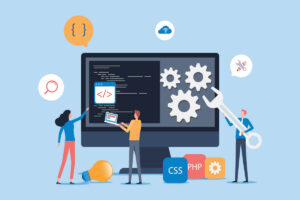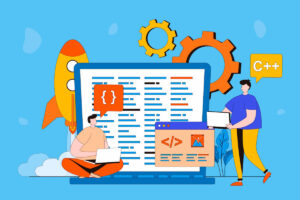PHP is a powerful and versatile programming language that is widely used for web development. With its flexibility and ease of use, mastering PHP can open up a world of possibilities for creating dynamic and interactive websites. In this article, we will explore some advanced techniques for PHP programming that can help you take your web development skills to the next level.
Object-Oriented Programming in PHP
Object-oriented programming (OOP) is a programming paradigm that allows developers to organize their code into reusable objects. In PHP, OOP can be a powerful tool for creating modular and maintainable code. Here are some key concepts of OOP in PHP:
- Classes: Classes are blueprints for objects in PHP. They define the properties and methods that an object can have.
- Objects: Objects are instances of classes. They encapsulate data and behavior related to a specific entity.
- Inheritance: Inheritance allows classes to inherit properties and methods from other classes. This promotes code reuse and helps in creating a hierarchy of classes.
- Polymorphism: Polymorphism allows objects of different classes to be treated as objects of a common superclass. This can simplify code and improve flexibility.
By mastering OOP in PHP, you can write more organized and efficient code that is easier to maintain and extend. Object-oriented programming allows for better code organization and reusability, making it easier to scale your applications as they grow. Additionally, by leveraging inheritance and polymorphism, you can create more flexible and adaptable code structures that can evolve with changing requirements.
Error Handling and Debugging
Error handling is an essential part of programming, as it allows developers to identify and fix issues in their code. In PHP, there are several techniques for handling errors and debugging:
- Try-Catch Blocks: Try-catch blocks allow developers to catch exceptions and handle them gracefully. This can prevent fatal errors from crashing the application.
- Error Reporting: PHP provides functions for setting error reporting levels, such as
error_reporting()andini_set(). By controlling error reporting, developers can debug their code more effectively. - Logging: Logging is a useful technique for recording errors and debugging information. PHP provides functions like
error_log()andlog_message()for logging messages to files or databases.
Mastering error handling and debugging techniques in PHP is crucial for creating robust and reliable applications. By implementing thorough error handling mechanisms, you can ensure that your applications are resilient to unexpected issues and provide a better user experience. Additionally, effective debugging practices can streamline the development process and help you identify and resolve issues more efficiently.
Database Interaction with PHP
Most web applications require interaction with a database to store and retrieve data. In PHP, there are several ways to interact with databases, such as MySQL, PostgreSQL, and SQLite. Here are some common techniques for database interaction in PHP:
- MySQLi Extension: The MySQLi extension is a popular choice for interacting with MySQL databases in PHP. It provides an object-oriented interface for executing queries and managing database connections.
- PDO (PHP Data Objects): PDO is a database abstraction layer in PHP that provides a consistent interface for interacting with different types of databases. It supports prepared statements, which can help prevent SQL injection attacks.
- ORM (Object-Relational Mapping): ORM frameworks like Doctrine and Eloquent provide a higher-level abstraction for database interaction in PHP. They allow developers to work with database tables as objects, simplifying the mapping between PHP classes and database tables.
Mastering database interaction techniques in PHP is essential for building scalable and efficient web applications. By choosing the right database interaction method and leveraging tools like ORM frameworks, you can optimize data retrieval and storage processes, improving the overall performance of your applications. Additionally, understanding database security best practices can help you protect sensitive data and prevent unauthorized access to your databases.
Security Best Practices in PHP
Security is a critical aspect of web development, as vulnerabilities in your code can expose sensitive data and compromise the integrity of your application. In PHP, there are several best practices for enhancing the security of your web applications:
- Input Validation: Always validate user input before processing it. Use functions like
filter_input()andhtmlspecialchars()to sanitize input and prevent malicious code injection. - Parameterized Queries: Use prepared statements and parameterized queries to prevent SQL injection attacks. This can help protect your database from unauthorized access.
- Cross-Site Scripting (XSS) Prevention: Escape output data using functions like
htmlspecialchars()to prevent XSS attacks. This can help protect your users from malicious scripts embedded in your web pages.
By mastering security best practices in PHP, you can build secure and resilient web applications that protect your users’ data and privacy. Implementing robust security measures ensures that your applications are shielded from common vulnerabilities and threats, safeguarding your users’ sensitive information and maintaining the trust of your audience.
In conclusion, mastering PHP requires a solid understanding of advanced techniques such as object-oriented programming, error handling and debugging, database interaction, and security best practices. By incorporating these techniques into your web development projects, you can create robust, reliable, and secure applications that deliver an exceptional user experience. Elevate your PHP skills by delving into these advanced concepts and practices, and watch your web development projects flourish with efficiency and effectiveness.
FAQs:
What is Object-Oriented Programming (OOP) in PHP?
Object-oriented programming (OOP) in PHP allows developers to organize their code into reusable objects, defining properties and methods for objects, enabling inheritance, and promoting polymorphism.
How can error handling and debugging be implemented in PHP?
Error handling and debugging in PHP can be implemented using try-catch blocks to catch exceptions, setting error reporting levels with functions like error_reporting() and ini_set(), and logging messages using functions like error_log() and log_message().
Why is mastering OOP important in PHP?
Mastering OOP in PHP allows developers to write more organized and efficient code, making it easier to maintain and extend applications in the long run.
Why is database interaction important in PHP web development?
Database interaction is crucial in PHP web development to store and retrieve data for web applications, enabling dynamic and interactive features for users.












+ There are no comments
Add yours